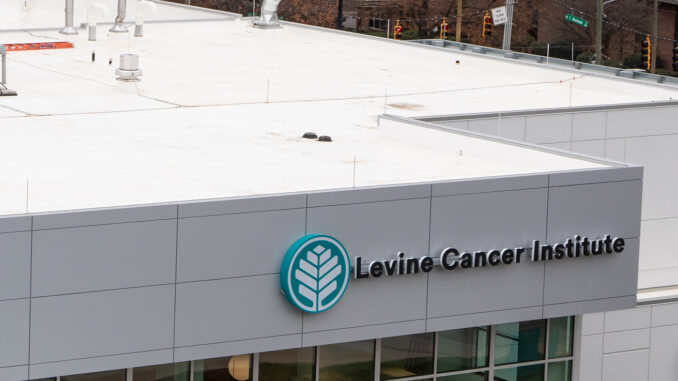
RALEIGH — A recent report released by North Carolina State Treasurer Dale Folwell highlighted a trend regarding alleged misuse of the federal 340B Drug Pricing Program by hospitals within the state.
“As I’ve said many times in the last few years, when it comes to health care costs and rising prescription drug cost, this is like an onion,” Folwell told reporters at the onset of the press conference. “The more we peel it, the more we cry. Unfortunately, the people who are crying are those that teach, protect and otherwise serve and taxpayers like them.”
The report, titled “North Carolina Hospitals: Extreme Price Markups, Failures in Transparency for Shoppable Hospital Services,” implies that rather than fulfilling its intended purpose of aiding low-income and rural communities, the 340B Program has been manipulated by hospitals to pull in bigger profits.
The 340B Program, established to assist in serving disadvantaged populations, has grown to become one of the nation’s largest federal prescription drug programs. Under the program, hospitals receive significant discounts, averaging around 34.7%, on outpatient drugs from manufacturers.
During a May 8 press conference, Folwell said North Carolina hospitals are charging commercially insured patients significantly more than Medicare rates for common services. Markups on services are as high as 1,120%, per the report.
“The fact that the State Health Plan is on a fiscally insolvent pathway, we cannot afford to spend this kind of money anymore in order to maintain this benefit for those that teach, protect and serve,” Folwell’s Deputy Treasurer Frank Lester said.
Lester had said last fall that Forbes had ranked the state as the third worst for overall health care results such as cost and availability of care.
Folwell was also joined by Julie Havlak, a policy analyst representing the State Health Plan; Sayeh Nikpay, associate professor at the University of Minnesota’s Division of Health Policy and Management; and Christopher Whaley, economist and associate professor in the Department of Health Services, Policy and Practice at the Brown University School of Public Health.
During the press event, examples were given from the report of patients paying hundreds or thousands of dollars more for procedures like urinalysis, cancer drugs and blood tests.
Uninsured patients also face inflated prices, sometimes over 1,000% more than Medicare rates, leading to concerns about financial impact and hospital debt collection practices previously revealed by Folwell’s office.
In August 2023, a report by Folwell’s office showed N.C. hospitals had sued more than 7,500 patients for more than $57.3 million in judgments, sometimes involving liens on homes and patients filing for bankruptcy.
Havlak noted that 340B hospitals have “no legal obligation” to share discounts with vulnerable patients or disadvantaged communities.
“Instead, our research found that 340B hospitals bill state employees an average markup of over five times their discounted acquisition cost for oncology drugs,” said Havlak. “Those price markups on cancer drugs can be lucrative.”
Havlak gave an example of one treatment of a cancer drug used to treat melanoma that 340B Hospitals can get for roughly $8,000 but were billing the state health plan almost $22,000.
According to the report, hospitals in North Carolina have been charging state employees high prices for cancer drugs. An example given was that, on average, certain hospitals billed patients at 5.4 times the discounted acquisition costs, resulting in an 84.8% higher markup when compared to nonparticipating hospitals.
Additionally, individual 340B hospitals reaped large profits between 2013 to 2021, with some bringing in as much as $6,026 in average profits per claim by charging up to nearly 13 times their acquisition costs for oncology drugs, per the report.
The profit figures are in the millions. The report cites Atrium Health recording $252 million in 340B cost savings in 2020, representing a 1,843% increase from its reported $13 million cost saving in 2008.
The report also gives examples showing a pattern of hospitals diverting these savings away from serving vulnerable communities and toward wealthier ones as the Affordable Care Act expanded.
After the Affordable Care Act passed, the number of 340B hospitals partnering with external pharmacies increased dramatically, from six in 2010 to 1,059 in 2022. As the program grew, many hospitals began contracting with pharmacies in wealthier neighborhoods with higher numbers of insured persons.
In 2013, 340B hospitals served neighborhoods where an average of 17.4% of the population was uninsured. By 2020, they were contracting with pharmacies located in neighborhoods where, on average, only 9.5% of the population was uninsured.
According to Folwell, the lack of transparency and oversight in hospital 340B revenues allows these practices to continue unchecked, and many of the hospitals fail to provide sufficient charity care to justify their tax exemptions.
The report’s recommendations urge lawmakers to enact Certificate of Need reforms to address the issue as well as passage of the Medical Debt De-Weaponization Act, which has been stuck in a committee following its filing.
Other proposals include requiring profitable 340B hospitals to share discounts with state employees and taxpayers, strengthening transparency requirements, and holding hospitals accountable for fulfilling their charitable obligations.
When asked if the Treasurer’s Office had any discussions with the hospitals in the report, Folwell said, “Everything’s always through a statement” from those entities.


